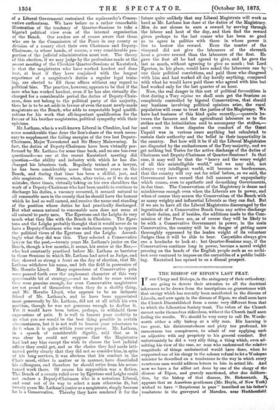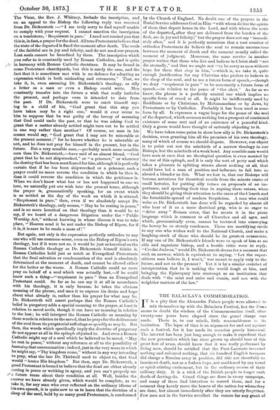THE BISHOP OF RIPON'S LAST FEAT.
IF our Clergy and Bishops, in the stringency of their orthodoxy, are going to devote their attention to all the doctrinal inferences to be drawn from the inscriptions on gravestones with that energy which has recently been manifested in the diocese of Lincoln, and now again in the diocese of Ripon, we shall soon have the Church Disestablished from a cause very different from that to which the Liberation Society trust. The rulers of the Chu,rch cannot make themselves ridiculous, without the Church itself soon feeling the results. We should be very sorry to call Dr. Words- worth either a silly bishop or a silly man. His learning is too great, 'his disinterestedness and piety too profound, his earnestness too conspicuous, to admit of our applying such an adjective with any propriety to his general conduct. But unfortunately he did a very silly thing, a thing which, even ad- mitting his view of the case, no man who understood the relative magnitude of things ecclesiastical would have done, when he supported one of his clergy in the solemn refusal to let a Wesleyan minister be described on a tombstone in the way in which every courteous man would address letters to him in actual life. And now we have a far sillier act done by one of the clergy of the diocese of Ripon, and gravely sanctioned, after due delibera- tion, by the bishop of that diocese, Dr. Bickersteth.
appears that an American gentleman (Mr. Hoyle, of New York) wished to have " Requieseat in pace" inscribed on his father's tombstone in the graveyard of Marsden, Bear .Hudderefteld
The Vicar, the Rev. J. Whitney, forbade the inscription, and on an appeal to the Bishop the following reply was received from Dr. Bickersteth :—" I am truly sorry to find myself unable to comply with your request. I cannot sanction the inscription on a tombstone, Requiescat in pace.' I need not remind you that this is, in feat, a prayer for the dead. All true Protestants believe that the state of the departed is fixed the moment after death. The souls of the faithful are in joy and felicity, and do not need our prayers. Lost souls cannot be benefited by them. The inscription which you refer to is constantly used by Roman Catholics, and is quite in harmony with Roman Catholic doctrines. It may be found in some Protestant churchyards, but this is rarely the case, and the fact that it is sometimes met with is no defence for adopting an expression which is both misleading and erroneous." That, we take it, is, even assuming Dr. Bickersteth's theology, as silly a letter as a man or even a Bishop could write. Men constantly transfer into the future a wish that really includes the present, and perhaps even is intended to date from the past. If Dr. Bickersteth were to catch himself say- ing to a child of his, "God grant that this step you have taken may be a right one," would it ever occur to him to suppose that he was guilty of the heresy of assuming that God could undo the past, or that he was asking God to grant that a matter already settled might turn out to be settled in one way rather than another? Of course, no man in his senses would say, "God grant that I may not be miserable at the present moment ;" for he knows whether he is miserable or not, and he does not pray for himself in the present, but in the future. But a very sensible man,—probably much more sensible men than Dr. Bickersteth,—have said of an absent friend, "God grant that he be not shipwrecked," or "a prisoner," or whatever the destiny that has been most feared for him, although it is perfectly certain that if he has been shipwrecked or a prisoner, such a prayer could no more reverse the condition in which he then is, than it could reverse the condition in which the petitioner is. When we don't know what has or has not happened to one we love, we naturally put our wish into the present tense, although the prayer is, grammatically speaking, for an event which is as settled as the day of the week on which it is uttered. "Requieseat in pace," then, even if we absolutely accept Dr. Bickersteth's theology, only means, "May he be resting in peace," and is no more heretical on that theology than it would be to say, if we heard of a dangerous litigation under the "Public Worship Act," without knowing in whose diocese it was to take place, "Heaven send it be not under the Bishop of Ripon, for if it is, it is sure to be made a mesa of ! "
But again, not only is the expression perfectly orthodox to any one who will use common-sense, even on the Bishop of Ripon's own theology, but if it were not so, it would be just as heretical on the Roman Catholic theology as Dr. Bickersteth himself thinks it. Roman Catholics hold just as much as Evangelical Protestants that the final salvation or condemnation of the soul is absolutely determined at the moment of death, and cannot be altered either for the better or the worse. A Roman Catholic could no more pray on behalf of a soul which was actually lost,—if he could know such a thing—" requiescat in pace" than an Evangelical Protestant could. So far as he can say it at all in accordance with his theology, it is only because he takes the obvious meaning of the phrase, and uses it to express his desire and hope about what already is, rather than his prayer for what may be. Dr. Bickersteth will assert perhaps that the Roman Catholic's belief in purgatory adds a special meaning to the prayer, at least in relation to saved souls, though it can have no meaning in relation to the lost; he will interpret the Roman Catholic as meaning by these words in relation to the saved, that he prays for the deliverance of the soul from its purgatorial sufferings as speedily as may be. But then, the words which specifically imply the doctrine of purgatory do not appear at all in the epitaph objected to. And even a Roman Catholic might say of a soul which he believed to be saved, "May he rest in peace," without any reference at all to the possibility of hastening that consummation; indeed, just in the very sense in which he might say, "Thy kingdom come," without in any way intending to pray, what the late Dr. Thirlwall used to object to, that God would "hasten His kingdom." But then, says Dr. Bickersteth, a good Protestant is bound to believe that the dead are either already resting in peace or writhing in agony, and you can't properly use future tense about their condition at all. Well, besides the answer we have already given, which would be complete, as we take it, for any man who ever reflected on the ordinary idioms of his own speech, it is quite new to na to learn that the doctrine of a sleep of the'sotal, held by so many good Protestants, is condemned by the Church of England. No doubt one of the prayers in the Burial Service addresses God as Him "with whom do live the spirits of them that depart hence in the Lord, and with whom the souls of the departed, after they are delivered from the burden of the flesh, are in joyand felicity;" but the prayer does not say inunedi- ately after," and it is perfectly notorious that a vast number of orthodox Protestants do believe the soul to remain unconscious between the moment of death and the moment usually called the moment of judgment. Moreover, the same service in another prayer recites that those who live and believe in Christ shall "not die eternally," and that we ought not "to be sorry as men without hope for them that sleep in him,"—which is, we take it, quite enough justification for any Christian who prefers to believe in the sleep of the soul, and to use a future form of speech,—though we deny "requiescat in pace" to be necessarily a future form of speech,—in relation to the peace of "the elect." As far as we know, the phrase is a perfectly neutral one which implies no specific form of creed at all. It might be indifferently used by Buddhists or by Christians, by Mohammedans or by Jews, by Protestants or by Catholics. Probably it has been used in some form by all. It expresses a vague hope for the peace of the soul of the departed, which assumes nothing but a prospect of continued existence of some sort and of an existence of a peaceful kind. Only a goose would have thought of seriously objecting to it.
We have taken some pains to show how silly is Dr. Bickersteth'a decision, even granting him all the premises of his own theology, many of which of course we should dispute. However, our object is to point out not the mischiefs of a narrow theology in our Bishops, but the mischiefs of a weak head. Any sensible man would have seen at once that no theological question is even mooted by the use of this epitaph, and it is only the sort of petty seal which takes a pleasure in splitting straws about nothing at all, that could have led a man of position and influence to fall into so absurd a blunder as this. What we fear is, that our Bishops will become notorious for theatrical recoils from the minute traces of small heresies, for putting silly vetoes on proposals of no im- portance, and spending their time in arguing these vetoes, when they should be giving their attention to the cares of the Church and the formidable spread of modem Scepticism. A man who could write as Dr. Bickersteth has done will be regarded by almost all who hear of it as a mere doctrinal prig, who is so eager to "drive away" Roman error, that he scents it in the pious language which is common to all Churches and all egos, and which, grammatically even, cannot be tortured into conveying the heresy he so sternly condemns. These are mortifying cavils to any one who wishes well to the National Church, and make a laughing-stock of those who should be its greatest ornaments. If any one of Dr. Bickersteth's friends were to speak of him as an able and sagacious bishop, and a hostile critic were tO reply, " Credat Judmus," would Dr. Bickersteth dream for a moment that such an answer, which is equivalent to saying, ,‘ Let the super- stitious man believe it, I won't," was meant to apply only to the future, and not to the present? Yet it is by a similar crotchet of interpretation that he is making the world laugh at him, and bringing the Episcopacy into contempt as an institution that deals with "the mint and anise and cumin, and not with the weightier matters of the law."



































 Previous page
Previous page